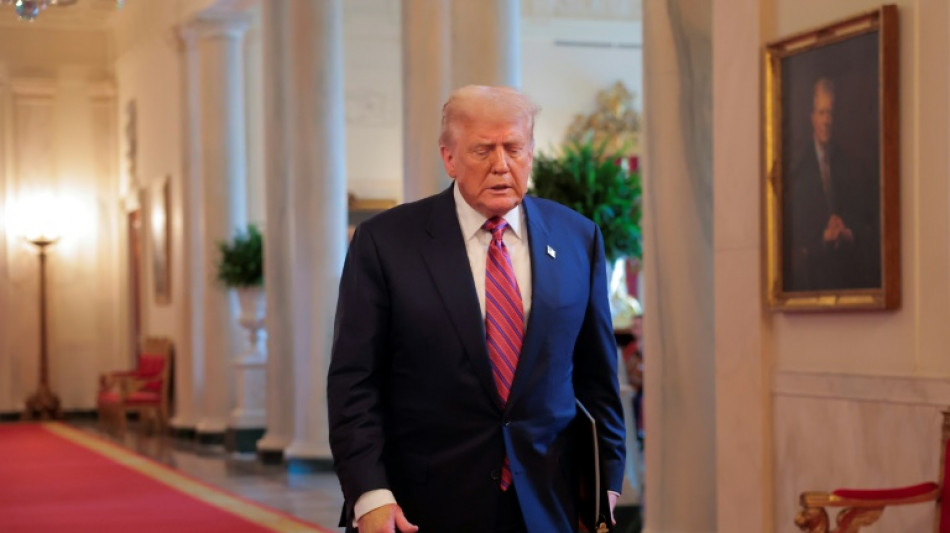

US to leave UN cultural body, citing 'national interest'
The United States said Tuesday it would quit UNESCO, saying the UN cultural and education agency, best known for establishing world heritage sites, is biased against Israel and promotes "divisive" causes.
"Continued involvement in UNESCO is not in the national interest of the United States," State Department spokeswoman Tammy Bruce said.
UNESCO called the US departure -- which it said will take effect in December 2026 -- regrettable, but unsurprising, and said its financial impact would be limited.
President Donald Trump had already ordered withdrawal from the United Nations Educational, Scientific and Cultural Organisation once before, in 2017 during his first term. President Joe Biden then reestablished US membership.
"I deeply regret President Donald Trump's decision to once again withdraw the United States of America from UNESCO," Director-General Audrey Azoulay said, adding the move contradicted fundamental principles of multilateralism.
"However regrettable, this announcement was expected, and UNESCO has prepared for it".
In recent years, Azoulay said, UNESCO had "undertaken major structural reforms and diversified our funding sources", including with private and voluntary governmental contributions.
The US share of UNESCO's total budget currently stands at eight percent, she said. This compares to an estimate of nearly 20 percent a decade ago, according to a UNESCO source who asked not to be named.
No staff redundancies were planned, Azoulay said.
Bruce described UNESCO as working "to advance divisive social and cultural causes" and being overly focused on UN sustainability goals, which she described as a "globalist, ideological agenda."
- 'Same as seven years ago' -
Bruce also highlighted what she said was the body's anti-Israeli position in admitting Palestine as a state.
"UNESCO's decision to admit the 'State of Palestine' as a member state is highly problematic, contrary to US policy, and contributed to the proliferation of anti-Israel rhetoric within the organisation," Bruce said.
The administration has also objected to UNESCO's recognition of heritage sites in the occupied West Bank and east Jerusalem as Palestinian.
Azoulay said the reasons put forward by the US "are the same as seven years ago" although, she said, "the situation has changed profoundly, political tensions have receded, and UNESCO today constitutes a rare forum for consensus on concrete and action-oriented multilateralism".
Washington's claims "contradict the reality of UNESCO's efforts", she added, "especially in the field of Holocaust education and the fight against antisemitism".
The source at UNESCO described the US move as "purely political, without any real factual base".
The organisation had already been "forced" to do without US money for several years after the 2017 departure, the source told AFP. UNESCO adapted but new sources of funding would still need to be found, the source said.
- 'Always welcome' -
Israeli Foreign Minister Gideon Sa'ar said he welcomed the US decision. "This is a necessary step, designed to promote justice and Israel's right for fair treatment in the UN system," he said on X.
French President Emmanuel Macron meanwhile said, also on X, that UNESCO had his "unwavering support" that would not weaken after the US departure.
The UN organisation describes its mission as promoting education, scientific cooperation and cultural understanding.
It oversees a list of heritage sites aimed at preserving unique environmental and architectural gems, ranging from Australia's Great Barrier Reef and the Serengeti in Tanzania to the Athens Acropolis and Pyramids of Egypt.
The UNESCO source said that the US will continue to be represented on the world heritage committee even after leaving the organisation formally, just as it had in 2017.
Trump was not the first to pull the United States out of UNESCO.
President Ronald Reagan ended US membership in the 1980s, saying the agency was corrupt and pro-Soviet. The United States reentered under the presidency of George W. Bush.
The American return under Biden was a major success for Azoulay, who became UNESCO chief in 2017, also because it included a pledge to pay back the US's contribution arrears to the tune of $619 million.
On Tuesday, Azoulay said the US could always return to the fold in the future.
"The United States of America is and always will be welcome," she said.
burs-jh/as/dc
Y.Papantoniou--AN-GR



